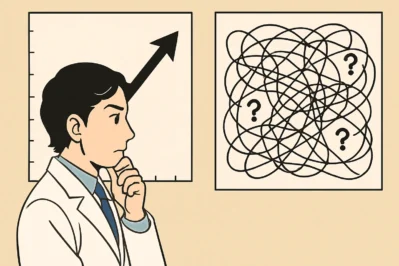Future Forecast or Flawed Fiction? Decoding Pandemic Models in Korean
Hello! Welcome to Maeil Hangeul, your partner in upgrading your Korean skills to the next level!
Today, we’re tackling a sophisticated and highly relevant topic: Interpreting Epidemiological Models and Their Limitations. This is for those of you who want to move beyond daily conversation and engage in the kind of high-level discourse you hear in Korean news, academic seminars, or policy debates.
Lately in Korea, just like around the globe, discussions about pandemic data, predictions of future waves, and the effectiveness of public health measures are constant. Being able to critically analyze and discuss these complex topics in fluent Korean will not only impress native speakers but also deepen your understanding of contemporary Korean society. Let’s learn how to talk like an expert!
Key Expressions for Critical Analysis
Here are four essential expressions you need to discuss models and predictions with nuance and precision.
1. 예측에 불과하다 (yecheuk-e bulgwahada)
- English Meaning: It’s nothing more than/merely a prediction.
- Detailed Explanation: This is a powerful phrase used to downplay the certainty of a forecast. The grammar pattern Noun + 에 불과하다 means “to be nothing more than Noun.” It injects a healthy dose of skepticism, suggesting that while a model’s output might seem definitive, it’s just one of many possibilities and shouldn’t be treated as fact. It’s perfect for arguing against alarmist headlines.
2. 변수를 고려하다 (byeonsu-reul goryeohada)
- English Meaning: To consider variables.
- Detailed Explanation: This is a cornerstone phrase for any analytical discussion. 변수 (byeonsu) means “variable,” and 고려하다 (goryeohada) means “to consider” or “to take into account.” When critiquing a model, you can point out which variables it might have missed. For example:
- 사회적 변수 (sahoejeok byeonsu): social variables (e.g., public compliance with rules)
- 경제적 변수 (gyeongjejeok byeonsu): economic variables (e.g., impact on small businesses)
3. 신뢰도에 의문이 제기되다 (silloedo-e uimun-i jegidoeda)
- English Meaning: Doubts are raised about its reliability/credibility.
- Detailed Explanation: This is a formal, passive expression you’ll frequently encounter in news reports and academic writing. 신뢰도 (silloedo) means “reliability” or “credibility,” 의문 (uimun) is “a doubt” or “a question,” and 제기되다 (jegidoeda) means “to be raised” or “brought up.” Using this phrase makes your critique sound objective and well-informed, as if you’re reporting a developing consensus.
4. -는 경향이 있다 (-neun gyeonghyang-i itda)
- English Meaning: To have a tendency to…
- Detailed Explanation: This grammatical pattern is incredibly useful for describing general trends without making absolute statements. It softens your claim and adds a layer of analytical sophistication. You can attach it to verbs to describe what models or data often do.
- 과대평가되는 경향이 있다 (gwadaepyeonggadweneun gyeonghyang-i itda): has a tendency to be overestimated.
- 최악의 시나리오를 가정하는 경향이 있다 (choeak-ui sinario-reul gajeonghaneun gyeonghyang-i itda): has a tendency to assume the worst-case scenario.
Example Dialogue
Let’s see these expressions in action. Two public policy students, Ji-hye and Min-jun, are discussing a news article.
A (Ji-hye): 민준 씨, 이 기사 봤어요? 새로운 역학 모델에 따르면 다음 달에 확진자가 폭증할 거래요.
(Min-jun, did you see this article? According to a new epidemiological model, cases are going to explode next month.)
B (Min-jun): 아, 봤어요. 하지만 그런 모델은 최악의 시나리오를 가정하는 경향이 있어서 신중하게 봐야 해요.
(Ah, I saw it. But those kinds of models have a tendency to assume the worst-case scenario, so we need to view them cautiously.)
A (Ji-hye): 하긴 그렇죠. 백신 추가 접종률이나 새로운 치료제의 도입 같은 긍정적인 변수를 충분히 고려하지 않았을 수도 있겠네요.
(That’s a good point. They might not have fully considered positive variables like booster shot rates or the introduction of new treatments.)
B (Min-jun): 맞아요. 그래서 그 모델의 결과는 확정된 미래가 아니라 예측에 불과하다고 생각해요. 벌써 전문가들 사이에서도 그 신뢰도에 의문이 제기되고 있어요.
(Exactly. That’s why I think the model’s result is merely a prediction, not a confirmed future. Doubts are already being raised about its reliability among experts.)
Culture Tip & Trend Deep Dive
In contemporary Korea, data literacy (데이터 리터러시) has become a crucial skill for the general public, not just specialists. Following the pandemic, public interest and scrutiny of government statistics and scientific models have skyrocketed.
You’ll see these very expressions used by panelists on serious debate programs like MBC’s <100분 토론> (100-Minute Debate) or analyzed by anchors on news channels like JTBC’s <뉴스룸> (Newsroom). When an expert says, “해당 모델은 몇 가지 주요 변수를 간과했기에, 그 예측은 참고자료에 불과합니다” (As the model in question overlooked several key variables, its prediction is nothing more than a reference point), you’ll now be able to understand the precise weight and nuance of their critique.
Mastering this vocabulary allows you to participate in and understand the sophisticated public discourse that shapes modern Korean society. It shows you’re not just a learner, but a thoughtful and critical observer.
Let’s Practice!
Great job making it this far! Let’s put your new knowledge to the test.
- Fill in the blanks using the expressions we learned today.
그 보고서는 현실적인 ________를 모두 ________ 못했기 때문에, 결과적으로 미래를 과소평가하는 ________을 보였다.
(Because the report failed to (consider) all realistic (variables), it showed a (tendency) to underestimate the future.) - Challenge: Using -에 불과하다, write a short sentence in Korean to express skepticism about a claim you heard recently (e.g., a weather forecast, a stock market prediction).
You’ve learned some incredibly useful expressions for high-level discussions. Keep practicing, and you’ll be debating with the best of them in no time!
Share your answers to the practice questions in the comments below!






